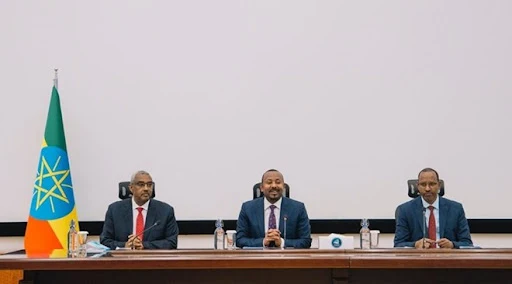Domestic Reform Initiatives:
Abiy Ahmed assumed office six years ago with a commitment to transformative reforms, responding to widespread protests across the nation. The disbandment of the Ethiopian People's Revolutionary Democratic Front (EPRDF) marked the birth of the Prosperity Party, aimed at expanding democratic space, implementing institutional reforms, ensuring good governance, and fostering national unity by shifting the narrative away from ethnic differences and grievances.
Challenges and Unintended Consequences:
While initial reforms aimed for positive change, Ethiopia witnessed a surge in ethnic violence during Abiy Ahmed's tenure, particularly in the Oromia region. Kidnappings and politically motivated murders escalated, prompting concerns about the security situation outside of the capital, Addis Ababa. The opposition from the Tigray People's Liberation Front (TPLF) led to a devastating civil war, resulting in significant human losses and an ongoing state of emergency in the Amhara region.
Economic Struggles and Governance Issues:
The Ahmed administration faced criticism for economic hardships, rising inflation, misuse of public resources, and increased corruption. The negative outcomes left a considerable impact on the nation's stability and prosperity.
Regional Dynamics and Potential Conflicts:
Externally, Ethiopia faces challenges on multiple fronts. A memorandum of understanding with Somaliland has raised the specter of a proxy conflict with Somalia. Egypt and the Arab League are reportedly pushing for war, exacerbating tensions. President Hassan Sheik of Somalia openly declared support for his nation during a joint press conference with the Egyptian President in Cairo, while other actors, including the United Nations, advocate for peaceful resolution.
Eritrea and Strained Relations:
Relations between Abiy Ahmed and Eritrea's leadership have soured. Somalia and Eritrea are forging ties, particularly in military affairs, adding a layer of complexity to the regional landscape. Egyptian President's invitation to President Isaias Afeworki for discussions in Cairo indicates a concerted effort to coordinate reactions to recent events in the region.
Conclusion:
Ethiopia stands at a critical juncture, grappling with domestic challenges and navigating complex regional dynamics. The ongoing Prosperity Party conference signifies a pivotal moment in shaping the nation's future. As the international community watches closely, hopes for peaceful resolutions and positive reforms remain, underscoring the need for dialogue and collaborative efforts to restore stability and prosperity in this historically rich and diverse nation.





Comments
Post a Comment